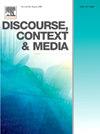Discursive practices of blame during the COVID-19 pandemic on Chinese Weibo
IF 3.1
2区 文学
Q1 COMMUNICATION
引用次数: 0
Abstract
The participatory affordance of web platforms has encouraged ordinary users’ participation in sociopolitical issues and opened up new channels for public opinion expression, particularly to blame authorities for their perceived wrongdoings. The current critical discourse analysis study contributes to this scholarship by investigating bottom-up discursive practices on user-generated texts on Weibo, the most widely used social media website in China. Using Social Media Critical Discourse Studies, we examine how netizens blame the elite group for their money and mask donations during the COVID-19 pandemic. They do this by constructing an identity for the elites as norm-breaching, outliers, and criminals, in contrast to their own norm-monitoring and judicial identity, thereby justifying the blame on the elites. Several discursive practices were identified with varying degrees of rationality and affectivity. Data includes comments presented in both textual and image forms.
COVID-19大流行期间中国微博上的指责话语实践
网络平台的参与性支持鼓励了普通用户参与社会政治问题,并为民意表达开辟了新的渠道,特别是指责当局的错误行为。当前的批评话语分析研究通过调查微博(中国使用最广泛的社交媒体网站)上用户生成文本的自下而上话语实践,为这一学术研究做出了贡献。利用社交媒体批评话语研究,我们研究了在COVID-19大流行期间,网民如何指责精英群体的金钱和面具捐款。他们通过构建精英的身份来实现这一点,将精英视为违反规范的人、局外人和罪犯,与他们自己的规范监督和司法身份形成对比,从而证明对精英的指责是合理的。几个话语实践被确定为不同程度的理性和情感。数据包括以文字和图像两种形式提出的评论。
本文章由计算机程序翻译,如有差异,请以英文原文为准。
求助全文
约1分钟内获得全文
求助全文

 求助内容:
求助内容: 应助结果提醒方式:
应助结果提醒方式:


